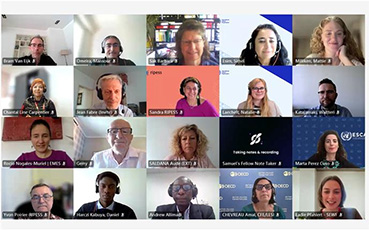Held virtually on 13 May 2025, the 52nd meeting of the United Nations Inter-Agency Task Force on Social and Solidarity Economy (UNTFSSE) brought together more than 40 participants from over 20 member and observer organizations. It was an opportunity to reflect on strategic priorities and ensure the continued relevance and sustainability of the Task Force.
Participants discussed ways to strengthen the presence of the SSE in international policy processes, including the Second World Social Summit, the Fourth International Conference on Financing for Development (FfD4), and the United Nations International Year of Cooperatives (IYC 2025), stressing the importance of coherence across the various global processes.
The newly released World Social Report 2025 was welcomed as a valuable contribution to the global policy dialogue. Its focus on inequality and economic insecurity further highlights the relevance of SSE as a means of promoting social inclusion, reducing poverty, and securing access to full, productive, freely chosen, and decent work for all.
Participants also welcomed the release of the report entitled “Financing for Development: Unlocking the Potential of the Social and Solidarity Economy”, prepared by the ILO as the UNTFSSE Secretariat. Developed in the context of preparations for FfD4, the report outlines key policy recommendations to position SSE within global financing agendas. It will be available in Arabic, Chinese, English, French, Russian and Spanish.
Also well received was the webinar “Mainstreaming the Social and Solidarity Economy in the 4th International Conference on Financing for Development (FfD4)”, co-organized by RIPESS and the UNTFSSE Technical Working Group on Financial Access and Support for SSE entities.
5th UNTFSSE Technical Symposium, December 2025 in Murcia (Spain)
The UNTFSSE is currently preparing its 5th Technical Symposium, which will be hosted by Spain in Murcia on 4–5 December 2025. The symposium will serve as a platform to assess progress, foster inclusive dialogue, and help shape the Task Force’s strategic direction.
Finally, the long-term sustainability of the UNTFSSE was discussed. It was noted that the Task Force continues to operate without a dedicated budget and depends on secretariat support provided by the International Labour Organization (ILO). In the context of ongoing discussions on UN reform, the Chair called for strategic planning to safeguard the Task Force’s ability to fulfill its mandate in the future.







